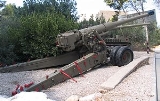
180 mm gun S-23
Encyclopedia
The 180 mm gun S-23 was a Soviet heavy gun of Cold War
era. It was developed in the early 1950s, with the design based on naval guns. Its first public appearance was the 1955 May Day parade in Moscow
. For some time, it was believed in the West that the S-23 was actually a 203mm weapon, and as a result it was often referred to as the 203 mm M1955 gun howitzer. However, after an example was captured in the Middle East during the 1970s this misconception was dispelled.
All were to be based on the same carriage. The order to start series production was given but after the production of seven S-23s (GRAU
index: 52-P-572), one S-33 and one S-43 by PO "Barrikady" in 1955 the project was cancelled. The seven guns remained in service until 1967 and were regularly shown during the annual May Day parades, being towed by AT-T atillery tractors. At the request of Syria, who needed a large-calibre gun system, the project was shortly revived at the end of the 1960s and twelve more S-23 guns were produced in 1971, as well as the new VOF28 round with RAP
projectile OF43. The other rounds were the VF-572 with HE projectile F-572 and the VG-572 with concrete-piercing projectile G-572.
Cold War
The Cold War was the continuing state from roughly 1946 to 1991 of political conflict, military tension, proxy wars, and economic competition between the Communist World—primarily the Soviet Union and its satellite states and allies—and the powers of the Western world, primarily the United States...
era. It was developed in the early 1950s, with the design based on naval guns. Its first public appearance was the 1955 May Day parade in Moscow
Moscow
Moscow is the capital, the most populous city, and the most populous federal subject of Russia. The city is a major political, economic, cultural, scientific, religious, financial, educational, and transportation centre of Russia and the continent...
. For some time, it was believed in the West that the S-23 was actually a 203mm weapon, and as a result it was often referred to as the 203 mm M1955 gun howitzer. However, after an example was captured in the Middle East during the 1970s this misconception was dispelled.
Design history
The S-23 was designed by NII-58 as part of a new series of heavy artillery systems consisting of the following types:- the 180 mm gun S-23;
- a 210 mm howitzer S-23-I a.k.a. S-33;
- a 280 mm mortar S-23-II a.k.a. S-43 and
- a 203 mm gun howitzer S-23-IV.
All were to be based on the same carriage. The order to start series production was given but after the production of seven S-23s (GRAU
Grau
Grau is a German word meaning "gray" and a Catalan word meaning "grade". It may refer to:* BAP Almirante Grau , a De Zeven Provinciën class cruiser in service with the Peruvian Navy* Grau Käse, Tyrolean grey cheese...
index: 52-P-572), one S-33 and one S-43 by PO "Barrikady" in 1955 the project was cancelled. The seven guns remained in service until 1967 and were regularly shown during the annual May Day parades, being towed by AT-T atillery tractors. At the request of Syria, who needed a large-calibre gun system, the project was shortly revived at the end of the 1960s and twelve more S-23 guns were produced in 1971, as well as the new VOF28 round with RAP
Rocket Assisted Projectile
A Rocket Assisted Projectile is an artillery or cannon round incorporating a rocket motor for independent propulsion. This grants the projectile both greater speed and range than an ordinary shell, which is propelled only by the ballistic force of the gun's exploding charge...
projectile OF43. The other rounds were the VF-572 with HE projectile F-572 and the VG-572 with concrete-piercing projectile G-572.

